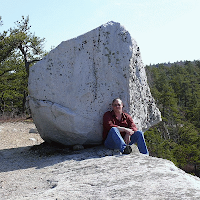I recently read an interesting book, Cobalt Red, about cobalt mining in the Congo (a country that has been cruelly exploited by the west for centuries). The Katanga Region of the Congo in Africa holds more cobalt than the rest of the planet combined (as well as a host of other metallic ore minerals).
Why does the Congo hold so much cobalt? It's complicated. Here's a paper with the details if you're up on your geochemistry. The bottom line is that around 4-5 million years ago (the Pliocene Epoch), near surface rocks were exposed to weathering under just the right pH conditions to form a mineral called heterogenite (CoOOH), an ore of cobalt. Being near the surface, in heavily weathered material, the mineral is relatively easy to mine by hand.
Why is cobalt important? It's critical for making the cathodes (positive terminals) of lithium-ion batteries (which are in everything from cell phones to Teslas). China, South Korea, and Japan produce almost 90% of the world's lithium-ion batteries and they all get their cobalt from the Congo.
While companies that use lithium-ion batteries like Apple, Samsung, and Tesla tout how socially responsible they are on their websites, the reality of cobalt mining in the Congo is that it's done under slave-like conditions by "artisanal miners" as young as 12 who work under horrific conditions destroying their health and the landscape for a pittance while consumers in the U.S. feel virtuous for being "green" and multinational companies make billions.
The author is a U.K. professor who's research specialty is modern slavery. He faced real dangers traveling through the Congo and visiting these mines since the government there and the primarily Chinese mine owners resort to violence and murder to keep the status quo. Reading the comments of the miners is heartbreaking - "Here it is better not to be born." It's a depressing but important read.








No comments:
Post a Comment